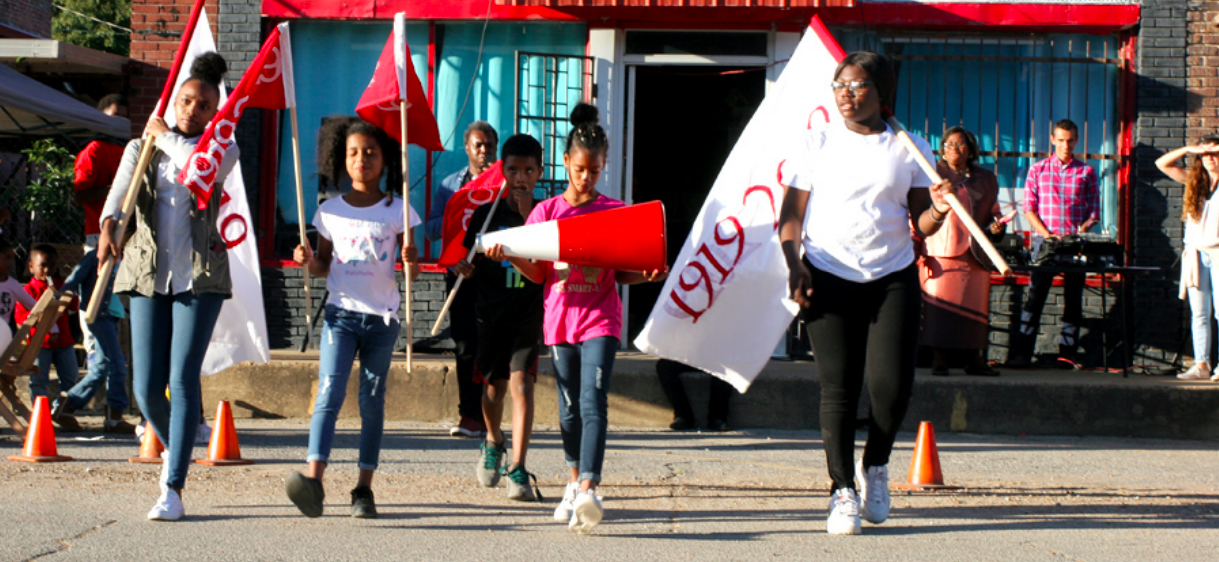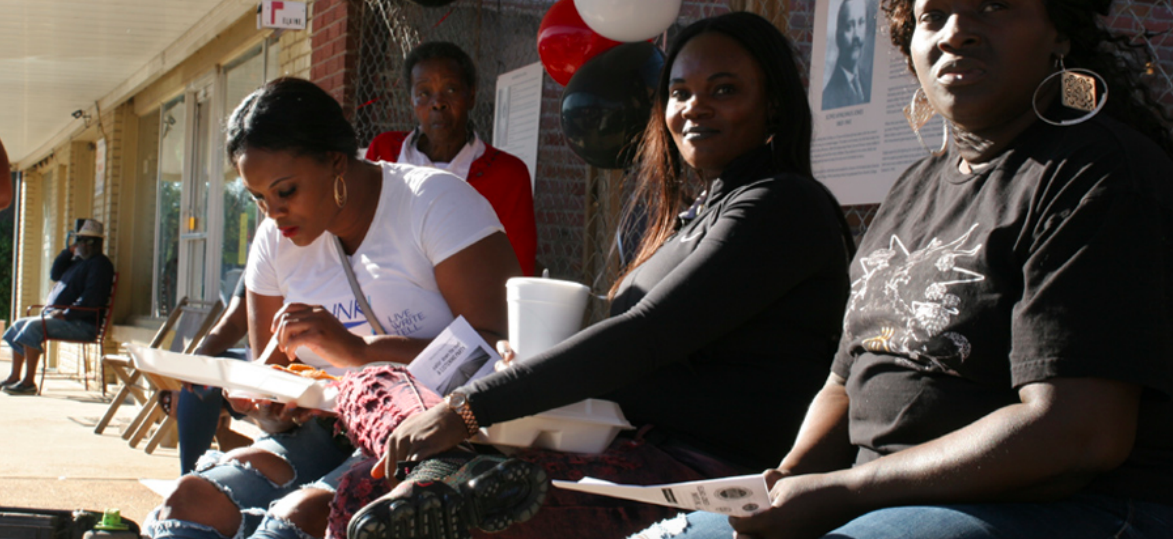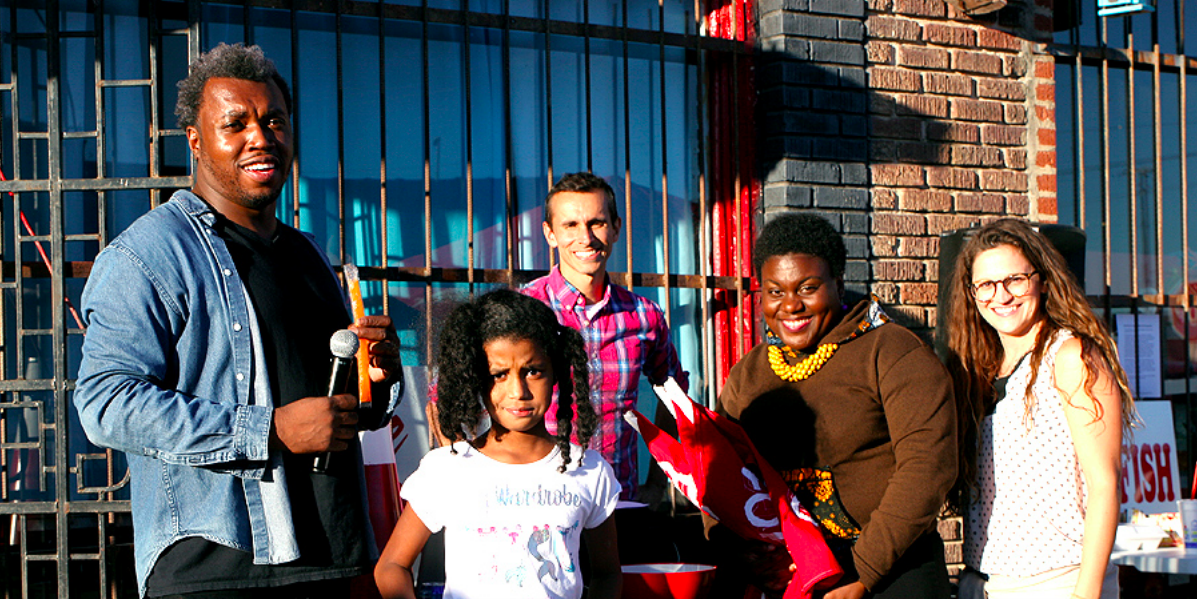Ashley: This is Ashley Teague of Remember2019 and today I am here with Arielle Julia Brown, Carlos Sirah, Yazmany Arboleda and Mauricio Salgado to talk about impact.
First, to talk about impact I think you have to talk about the community you are impacting, right? You must identify where the impact would take place before being able to analyze any results. The community that Remember2019 is partnering with is the Black community of the Arkansas Delta, South Phillips County, Arkansas. I am not a member of this community. And I think it is crucial to acknowledge that. To note where I come from in entering this work and conversation. I am a white woman and I do not live here. I have sometimes had trouble assessing impact on this program for that very reason. On this project we talk a lot about cultural specificity, and I believe that to measure impact you have to be working with cultural specificity. It is foolish for someone from outside a community to think they are able to measure impact in someone else’s home, someone else’s neighborhood and culture. That sort of measuring will never be authentic, it is colonizing, and it is just arrogant.
Secondly, the word impact, to me, implies assessing change. No, maybe it doesn't always need to mean change, but I do feel there is an implicit assumption of positive change when dealing with “impact” and for me that feels icky in this community. This community is all set. To quote a mentor of mine, Arielle Julia Brown, who was quoting a mentor of hers, this community has technologies toward freedom that they have been using those for a very long time. This community has so much wisdom that I have been extraordinarily humbled and gifted to get to learn from. Impact, as a word, feels one way to me and so I think a better word is value. What value has Remember2019 been to this community? And how has that value had a two-way flow, reciprocity, mutual exchange? I can say, without a doubt, and somewhat selfishly, that I have been incredibly impacted by this work. And I can talk about that more later, if we’re interested.

Last, one of my collaborators on this project gave me a book recently that I happen to be reading right now and so is actively influencing my thinking around this topic.
The book is called The Revolution Will Not Be Funded: Beyond the Nonprofit Industrial Complex edited by Incite! It is a series of essays problematizing the Nonprofit Industrial Complex. The book asks how nonprofits, funders, foundations might be invested in maintaining status quos. It asks how your work is more than just program development and service delivery but is actually about organizing. How are you, or how is your organization or program, part of a larger revolution or movement and not just the end goal in and of itself?
In our values we say that we believe in transformative justice. That we believe that a transformation of our social systems must be enacted to justly hold all members of the beloved community. Let me unpack that for the folks who, like me, grew up in white suburbia. The beloved community is a phrase that the philosopher-theologian Josiah Royce (who founded the Fellowship of Reconciliation) first coined in the early days of the 20th Century, and was made known by Dr. Martin Luther King, Jr. (also a member of the Fellowship of Reconciliation). King invested the term with a deeper meaning, a realistic, achievable goal that could be attained by a critical mass of people committed to and trained in the philosophy and methods of nonviolence.
A transformation of our social systems is referring, of course, to the prison system, which is a direct descendant of chattel slavery, as well as our school systems (of which New York State, where I live, is the most segregated in the nation, with 64 percent of Black students attending schools that are less than 10 percent white) and our political systems, our electoral systems (voting registration, voter zoning, voter access), our healthcare system, our economic systems, our food systems, our immigration systems, our transportation systems, and so on and so forth. All these systems are steeped in a society built on and feeding off the dregs of slavery. One community member I met here in Elaine Arkansas, Shelia Walker, asked “how do we make good on a promise to all in a country that was founded on equality and oppression, on freedom and on slavery?”
Did I get off topic? To sum up - how do we think outside the systems that have been handed down to us, outside the Nonprofit Industrial Complex that we are familiar with when defining “impact,” or as I call it value? In the same way we strive for alternate ways of doing the work (feminist, queer, anti-white supremacist, etc.), can we decolonize our evaluative lens as well? How do we create parallel (or perpendicular) modes and languages for measurement?
Ok. Time for a dialogue.

Mauricio: You speak of the ickiness of relating impact to change - has that always been your mindset? You’ve been doing work like this for a while now - what has been the progression of your change of thought? What challenges have you experienced measuring impact as change?
Ashley: Funders want hard numbers, right? They want measurable impact. And we can totally do that on this project- number of events held, number of people attending, number of community members involved, number of community partners engaged, number of dollars going directly to community, website clicks, etc. But the real impact of this project lives somewhere else. I am not spiritual, but my partners on Remember2019 (for the most part) are. And the way they dial in impact exists somewhere in that spiritual realm. It lives in a belief in something higher, in faith.
We know that audiences are changed while watching a performance. But it is hard to say just how. How are they different? What happens to people in their seats as they participate in theatre? How are people transformed by cultural experiences and exposure? This kind of change can also feel intangible, maybe even spiritual as we enter a liminal space like the theater.
And it is that kind of change that my work generally looks at. How can art and peer-to-peer storytelling enrich a community, bring them in proximity to experiences they might not otherwise have and thus raise awareness of issues in a moving, compelling way? And that question is still at the core of impact for me on many of my other programs. But because this project is so insular, that version of impact (i.e. how are people are changed), just isn't a right fit for the work.
Early on in the program’s development we decided we were only engaging with the Black community. Remember2019 isn’t about educating white folks or building bridges to that facet of community who often seems hell bent on preventing progress for their Black neighbors. Remember2019 is for the Black community and their self-determined work around memory, reflection and healing. And while healing is a kind of change, and we do strive to offer affinity spaces for healing, like I said before, that kind of change, healing, it’s a spiritual thing, spiritual healing. How do you measure the soul? Is there a scale of achievement for healing? Have we ever officially “healed?”
This work is in the reach. Never arriving. Always reaching a little further. And sometimes finding ourselves in the ongoing of the other.

Arielle: You mention the program having impact on you personally; can you say more about that?
Ashley: Yes, I get to work on many really amazing programs with teams whose focus range from traditional theatre to social practice, artistic activism and cultural organizing. Working with the Remember2019 members I am challenged to be the best cultural worker I can be. They truly set the bar above and beyond any other practitioners I have had the privilege of walking alongside (and that’s over the past 10+ years of doing this work). Their questions, their work ethic, their generosity, their points of view, their experience and expertise - all push me to be better, to listen more deeply, to work more hours, to be more thoughtful in my own analysis.
I think that maybe in the beginning there was some suspicion about involving me on the program? Arielle actually was pretty transparent about her uncertainty. And that suspicion is my responsibility, right? To prove my place on the team, to earn the trust that generations of my ancestors have broken time and again. There is this distance between us, especially between white woman and women of color, because of my race privilege and because of the horrific way white women have behaved (and continue to behave) toward their sisters of color. I strive to try and repair that harm in all my interactions, to reach across that divide between us, to learn each day how to be a better ally and to try to be humble, to understand that I may never bridge the gap and that it isn't Arielle’s (or anyone else's) responsibility to meet me where I am. And I do think that, through the work, we have become friends. I think she would count me among her friends. I think she knows I would be there in a heartbeat if she ever needed me. And that friendship, which has grown between all five of us over the course of the program, is so precious to me. I respect these collaborators and learn so much from them. I am truly better for knowing them and for the opportunity to witness their brilliant practices at play on Remember2019.
